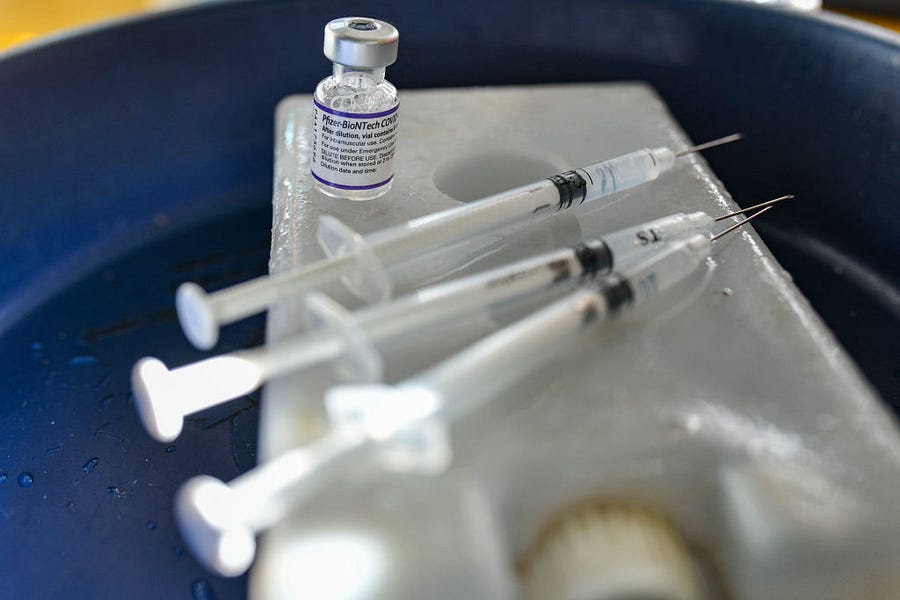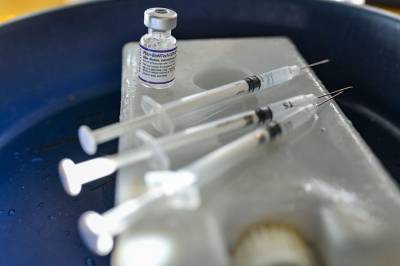A widely shared article from The Gateway Pundit claims that “according to a recently released medical study, in a group of 37 sperm donors, across 220 samples collected, the impact of the mRNA COVID vaccine, BNT162b2 produced by Pfizer, caused men to experience a drop in fertility of more than 20%.”
The Gateway Pundit article (with the headline“Confirmed: Pfizer’s COVID Vaccine Reduces Sperm Count in Men, Another Adverse Affect [sic] Of The Forced Vaccine Tyranny”) also claims that “in short, the Pfizer COVID vaccine does in fact reduce male fertility.”
The Gateway Pundit has previously promoted misinformation about the COVID-19 vaccine, such as the false claim the COVID vaccine is linked to prion disease.
In an email to The Dispatch Fact Check, Centers for Disease Control and Prevention spokesman Dr. John Su said that “no unusual or unexpected patterns of reduced sperm count in men following immunization that would indicate COVID-19 vaccines are causing or contributing to this condition.” Su added that the “CDC continues to recommend that everyone who is eligible should get vaccinated.”
The article fails to mention that the study only shows a temporary decrease in sperm count post-vaccination, but does not show that the COVID vaccine reduces male fertility, as the article claims.
The Gateway Pundit references a study titled “Covid-19 vaccination BNT162b2 temporarily impairs semen concentration and total motile count among semen donors.” The Gateway Pundit claims the study “showed a staggering drop in male fertility, with the average decrease being 22.1% across the study group.”
The study itself is clear that the COVID-19 vaccine only temporarily reduces sperm count, noting so in the title of the study. The study also emphasized that its findings should actually “support vaccination programs.” The relevant portion of the study reads: “Since misinformation about health-related subjects represents a public health threat, our findings should support vaccinations programs. Further studies concentrating on different vaccines and populations (ex. subfertile patients).”
The study was first published on June 17 in the journal Andrology, which is the “joint publication of the European Academy of Andrology (EAA) and the American Society of Andrology (ASA)” and has been peer-reviewed. In an email to The Dispatch Fact Check, Stanley Perlman, professor of microbiology and immunology at the University of Iowa, described the journal as “reputable” and said the study has been misinterpreted by The Gateway Pundit.
Vincent Racaniello, professor of microbiology and immunology at Columbia University, noted that any vaccine or infection that leads to inflammation may temporarily reduce sperm count.
“In fact it [the study] shows that there is a decrease in sperm count post-vaccination but the sperm counts do recover and the authors conclude that the effect is temporary,” he noted. “The effect appears to be a consequence of inflammation that occurs after vaccination. It was previously known that inflammation does reduce sperm count.”
The effect, Racaniello explained, does not only occur with the COVID vaccine: “Any vaccine or infection that leads to inflammation will have the same effect.”
The Gateway Pundit fails to note what the study makes clear: that the decrease in sperm count post-vaccination is temporary.
A spokesperson for Pfizer also told The Dispatch Fact Check via email: “Numerous studies and real-world evidence show the Pfizer-BioNTech COVID-19 vaccine does not cause infertility. With more than one billion doses of the vaccine administered around the world, the safety profile for the vaccine for all authorized groups continues to be favorable.”
If you have a claim you would like to see us fact check, please send us an email at factcheck@thedispatch.com. If you would like to suggest a correction to this piece or any other Dispatch article, please email corrections@thedispatch.com.







Please note that we at The Dispatch hold ourselves, our work, and our commenters to a higher standard than other places on the internet. We welcome comments that foster genuine debate or discussion—including comments critical of us or our work—but responses that include ad hominem attacks on fellow Dispatch members or are intended to stoke fear and anger may be moderated.
With your membership, you only have the ability to comment on The Morning Dispatch articles. Consider upgrading to join the conversation everywhere.